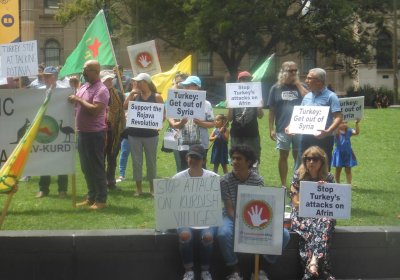The Kurdistan Communities Union (KCK) is an umbrella group of left-wing organisations in Turkey, Syria, Iraq and Iran that adhere to the ideology of Kurdish revolutionary leader Abdullah Ocalan (known as “Apo”), currently in jail in Turkey. Forces associated with the KCK have helped lead the Rojava Revolution in Syria’s north, which marked its sixth anniversary on July 19, the day Kurdish-led forces staged an insurrection.
People's Defense Units (YPG)
I am almost four years old. I am on horseback with my mother as our family is being smuggled from northern Iraq across the border on a clear spring dawn. It is 1988 and the Iran-Iraq War is at its final, gruelling, violent end.
A cool breeze blows against us.
I stare up at the sky tracking the sound of the planes and anticipating the familiar silence before the bang of exploding bombs shatter the earth. The planes circle overhead, but this plane is different from the other planes we’ve seen so often.
The defeat of ISIS in Syria last year raised hopes that the long-running war that has displaced more than two-thirds of the population might be coming to an end. However, the attempted Turkish invasion of the Afrin region of Rojava (Syrian Kurdistan), which began on January 20, has underlined that the war is in fact intensifying.
The dark clouds of 21st-century fascism are once again hanging over the heads of the people of northern Syria. As if the inhabitants of the region often referred to as Rojava haven’t suffered enough over the course of the past 7 years of war, the Turkish state has come to the conclusion that the time is ripe to pick up the fallen, bloodied sword from the corpse that is Islamic State.
Together with Salafist mercenaries carrying flags of the Syrian ‘rebels’ – one of the many components of what at one historical juncture seemingly all so long ago was a cohesive ‘Free Syrian Army’ – Erdogan’s regime vows a ‘swift operation’ to destroy ‘terrorism’ in Afrin.
Afrin invasion: Turkey attacks northern Syria’s democratic revolution — with Russian and US approval
Three years after Kurdish-led forces liberated the northern Syrian city of Kobane from ISIS — after a months-long siege that captured the world’s imagination — the democratic, multi-ethnic and feminist revolution in Syria’s north is facing a new assault.
After receiving approval from Russia, the Turkish state has launched an air strike with 69 jets, bombing the Afrin centre and Cindirêsê, Reco, Shera, Shêrawa and Mabeta districts in northern Syria, ANF News reported on January 20.
Academics and international human rights activists launched a petition calling upon world powers to act against Turkish aggression against Afrin, ANF News reported.
The umbrella organisation of political and social movements in northern Syria, Movement for Democratic Society (TEV-DEM), released a statement on recent attacks and threats by the Turkish state.
Turkey has attacked the Afrin district in northern Syria, which is part of the Northern Syria Democratic Federation that is seeking to create a new revolutionary system of “democratic confederalism”.
Syrian Democratic Forces (SDF) finally liberated Raqqa, in northern Syria, from ISIS occupation on October 17, after a battle of 135 days. In 2014, ISIS declared Raqqa its capital, which makes its defeat a decisive event.
The SDF is a multi-ethnic and multi-religious armed force made up of dozens of militias that is committed to the political project of “democratic confederalism”, the participatory democratic project associated with the Kurdish-led Rojava Revolution.
The flags of the Women’s Protection Units (YPJ) and Shengal Women's Units (YJS) were planted in the city centre of Raqqa, which had been the capital city of ISIS, on September 14.
Flanked by military commanders, Iraqi Prime Minister Haider al-Abadi was in the nation’s second-largest city, Mosul, on July 10 to announce the city’s liberation from ISIS.
An end to the three-year-long rule by the extremely violent and authoritarian terrorist group is obviously good news for the city's residents. But it seems unlikely the group’s defeat will mean an end to their suffering, which began long before ISIS captured the city in June 2014.
A conference on the Rojava Revolution will be held as the struggle in northern Syria enters perhaps its most critical phase.
“The Rojava Revolution in Northern Syria: An experiment in radical democracy, feminism & ecology” will be held in Melbourne on June 30 and July 1. The event aims to inform participants about the revolutionary process, to discuss the problems it faces and to build support for it.
- Previous page
- Page 2
- Next page










